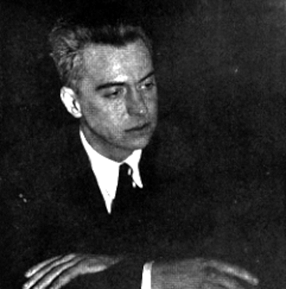Recitative
Regard the capture here, O Janus-faced,
As double as the hands that twist this glass.
Such eyes at search or rest you cannot see;
Reciting pain or glee, how can you bear!
Twin shadowed halves: the breaking second holds
In each the skin alone, and so it is
I crust a plate of vibrant mercury
Borne cleft to you, and brother in the half.
Inquire this much-exacting fragment smile,
Its drums and darkest blowing leaves ignore,—
Defer though, revocation of the tears
That yield attendance to one crucial sign.
Look steadily—how the wind feasts and spins
The brain’s disk shivered against lust. Then watch
While darkness, like an ape’s face, falls away,
And gradually white buildings answer day.
Let the same nameless gulf beleaguer us—
Alike suspend us from atrocious sums
Built floor by floor on shafts of steel that grant
The plummet heart, like Absalom, no stream.
The highest tower,—let her ribs palisade
Wrenched gold of Nineveh;—yet leave the tower.
The bridge swings over salvage, beyond wharves;
A wind abides the ensign of your will . . .
In alternating bells have you not heard
All hours clapped dense into a single stride?
Forgive me for an echo of these things,
And let us walk through time with equal pride.
This poem is in the public domain. Published in Poem-a-Day on June 3, 2023, by the Academy of American Poets.
“Recitative” appears in Hart Crane’s collection White Buildings (Boni & Liveright, 1926). In Hart Crane and the Homosexual Text: New Thresholds, New Anatomies (University of Chicago Press, 1990), Thomas E. Yingling, former associate professor of English at Syracuse University, writes that “[t]he poem seems [. . .] to have found its final image of triumph over duality, an eternal moment (‘All hours clapped dense into a single stride’) that will resist the narrative intrusions of a homosexual life. But the poem undercuts itself: the last two lines suggest a continued split rather than a union. The poet is no longer Narcissus but that other figure of reflection, the nymph Echo, only a partial presence, able only to call to mind half-truths, half-speech—authored by others rather than by himself [. . .]. And, if the poem begins with making the problem of homosexuality visible to itself, it ends by making it invisible: no one sees Echo; she is voice alone. This does not ‘solve’ the problem of homosexual desire but merely gets rid of the body as its site. [. . .] Nevertheless, it is only through access to such unifying myths of desire as are recorded on the surface of the text that the homosexual and his ‘brother in the half’ may acquire the authority to pass meaningfully through history: the equality sought in the final line surely refers to the existential inequality homosexuals more usually face.”

